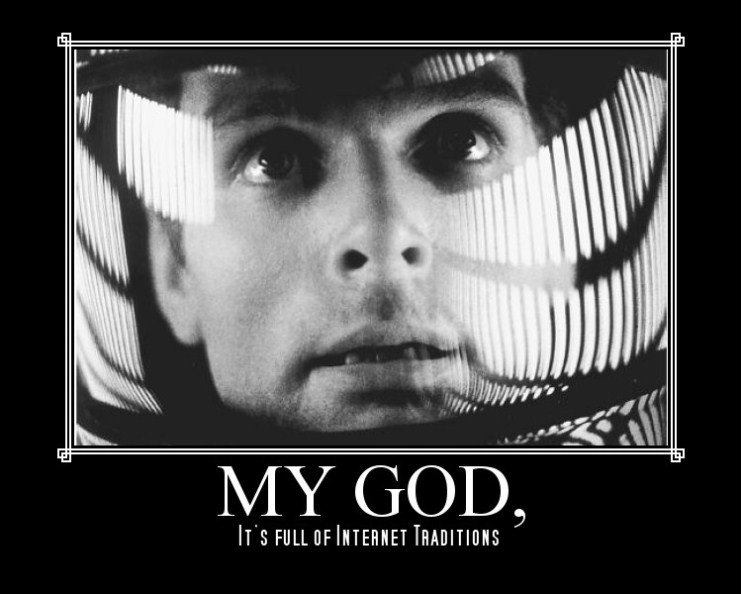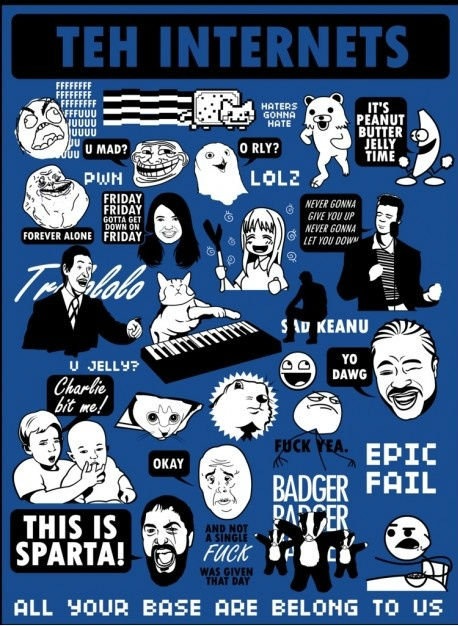 A recent article is claiming that internet memes are "the most significant cultural phenomena of our time". How can we assess this claim?
A recent article is claiming that internet memes are "the most significant cultural phenomena of our time". How can we assess this claim?My immediate reaction was skepticism. The author doesn't consider any other candidates - making me wonder whether they had thought the claim through. For example, how can internet memes be more significant than the internet? Or, what about technological progress? Or, how about language?
If confronted with these objections I think advocates of this thesis would have to do some clarification of definitions. For example, they might argue that a "cultural phenomena" refers to something that can be transmitted from person to person (typically over an electronic network). "The internet" doesn't really qualify here - since you can't pass "the internet" from one person to another. As for language, that's been around for a very long time. It might well be highly significant - but it would be hard to claim that it is "of our time" since it isn't just of our time.
How then do internet memes stack up after these caveats have been imposed? Maybe not too badly - but if they win, their victory seems a bit hollow. The term "internet meme" does not really refer to a particular cultural phenomenon, but rather to a whole class of phenomena. It mostly just refers to things that are shared a lot. So the claim that internet memes are "the most significant cultural phenomena of our time" boils down to the idea that the most popular things are the most significant ones. I wouldn't normally equate popularity with significance - but they are certainly correlated. For one thing, sheer popularity tends to make things have more impact - which tends to make them more significant.
Perhaps, competition for internet memes in this area comes from machine intelligence - or indeed, computer software in general. This could potentially be more impactful without being more popular. Relatively few people need to understand software for it to have a large impact. As with internet memes, machine intelligence is influencing elections and leading to social change - and notoriously, software is eating the world. In a war metaphor, internet memes would be bullets but machine intelligence systems would be generals.
The article closes with "memes are, without a doubt, the most significant cultural phenomenon of our time". Presumably we are supposed to read that as "internet memes" - or else it is an empty tautology. That claim seems even more debatable: there seems to be considerable room for doubt.
 I described
I described  The Journal of Visual culture, Themed Issue:
The Journal of Visual culture, Themed Issue:  Humans judge memes, in part by the success, health and fitness of those that bear them. That makes some sense. However, the modern world allows some memes to disguise their bearers. Information obtained via the internet or television may be transmitted by a collection of individuals, many of whom are unseen. This allows one of our
Humans judge memes, in part by the success, health and fitness of those that bear them. That makes some sense. However, the modern world allows some memes to disguise their bearers. Information obtained via the internet or television may be transmitted by a collection of individuals, many of whom are unseen. This allows one of our  The internet has turned into quite a crucible for all things meme-related. In the wake of
The internet has turned into quite a crucible for all things meme-related. In the wake of  To get meta, here is a curated list of other folks' lists of the best memes of 2013. Enjoy:
To get meta, here is a curated list of other folks' lists of the best memes of 2013. Enjoy: Daniel Dennett described the internet as the drosophila of memetics in a 2009 Harvard lecture. It's so true.
Daniel Dennett described the internet as the drosophila of memetics in a 2009 Harvard lecture. It's so true.
 OK, I risk stating the obvious here, but: memes are cool. By this I mostly mean that memes are cool to the younger generation - the kids who are growing up with the internet. Yes, some memes are a daft waste of time - and it's possible to overdo it - but
OK, I risk stating the obvious here, but: memes are cool. By this I mostly mean that memes are cool to the younger generation - the kids who are growing up with the internet. Yes, some memes are a daft waste of time - and it's possible to overdo it - but 
 A roundup of lists from other sites:
A roundup of lists from other sites: There are quite a few meme-related "infographics" out there. Here's a few of them:
There are quite a few meme-related "infographics" out there. Here's a few of them: It continues with
It continues with 











